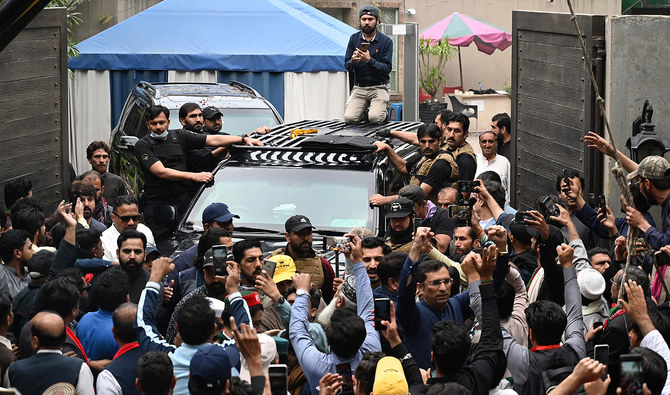ISLAMABAD: Former prime minister Imran Khan on Saturday voiced fears of his arrest as he left his Lahore home for an Islamabad district court for appearance in a case involving the sale of state gifts, amid stringent security and deployment of thousands of law enforcers around the Islamabad judicial complex.
The development comes after days of attempts by Khan and his Pakistan Tehreek-e-Insaf (PTI) party to prevent the law enforcers from arresting the ex-premier after an Islamabad district court issued his non-bailable arrest warrants in the case.
On Friday, the Islamabad High Court (IHC) had suspended the non-bailable arrest warrants against Khan until March 18 and gave him another opportunity to appear before the Islamabad district and sessions court to face charges in the case.
Khan, whose caravan was still on its way to the capital, recorded a video message for his supporters and apprised them of his fears about a possible arrest by the law enforcement.
“I want to tell you all that they have made a complete plan to arrest me and this proves their malafide intent,” he said.
The former premier said he intended to appear before the court a few days ago as well, but the police “attacked” his Lahore home with the sole purpose of putting him behind bars.
“Why put me in jail, because it is part of the London plan,” he said. “This is Nawaz Sharif’s demand to put Imran Khan in jail and he may not take part in election.”
Information Minister Marriyum Aurangzeb criticized the former prime minister for falsely claiming before the international media that he had protective bail in the case.
“If you have the bail, then why you portray yourself as disabled, elderly,” she questioned Khan at a press conference.
The minister noted that Khan supporters attacked police with batons and threw petrol bombs on their vehicles, but still the former premier got relief from a Lahore court that barred the law enforcers from arresting him in nine different cases.
“These petrol bombs were not thrown on police, Rangers vans, they were thrown on court orders that police went there to implement,” she said.
“Sixty-five policeman were injured, court gave him relief. No one is there to question.”
The Islamabad administration imposed Section 144 (ban on public gatherings and display of weapons) in the federal capital, while around 4,000 police and paramilitary personnel have been deployed on security duty during proceedings of the case, which has come to be known as the Toshakhana reference, at the judicial complex, according to the Islamabad police.
“Section 144 is in force in Islamabad. Private companies, security guards or individuals are prohibited from carrying weapons,” the Islamabad police wrote on Twitter. “Carry proof of vehicle integrity while driving.”
Authorities have also imposed Section 144 in the twin city of Rawalpindi and directed citizens to avoid unnecessary movement.
Khan, who until now attempted to evade arrest in the case, left his Lahore residence for Islamabad Saturday morning, his party wrote on Twitter.
Meanwhile, police raided Khan’s Lahore residence when the ex-premier was traveling to Islamabad.
The law enforcers removed camps and other obstacles outside Khan’s home as well as baton-charged and arrested Khan supporters who opposed the “anti-encroachment operation.”
The vicinity was a site of clashes between PTI supporters and police this week after a team of Islamabad police, backed by their Lahore counterparts and paramilitary personnel, attempted to arrest Khan on Tuesday on the orders of the Islamabad district court.
While Khan alleged the undue use of force by the police, the Punjab government said his supporters pelted stones and threw petrol bombs at law enforcers.
















